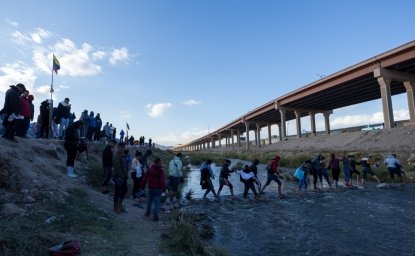The Case for Accepting Syrian Refugees
The U.S. vetting system is strong, and so is the American tradition of welcoming the oppressed.
The U.S. vetting system is strong, and so is the American tradition of welcoming the oppressed.
More than 10 governors sent letters to the Obama administration on Monday, all bearing the same message: We refuse to accept Syrian refugees into our state and local communities. But turning against Syrians fleeing horror and violence in the Middle East is precisely the wrong response to last week’s terrorist attacks in Paris. In fact, Islamic State, also known as ISIS, is looking for proof that the West stands against Arabs and Muslims.
Throughout history the U.S. has offered refuge to people fleeing persecution, and the world needs America again. More people have been displaced globally than any time since World War II, with the Syrian conflict uprooting more than 11 million. About four million have fled to neighboring countries, primarily Turkey, Lebanon and Jordan. Nearly five years into the conflict, it is obvious that the crisis won’t end without American leadership.
When I served as ambassador to Iraq, I witnessed how the slow pace of processing left Iraqi refugees—including many who worked for the U.S. military—stranded in danger. Some died waiting for visas. That’s why the Obama administration should commit to resettling 100,000 Syrian refugees over the next year.
This is not an unmanageable security risk to U.S. citizens, as the governors and others have alleged. The U.S.’s vigorous screening process involves vetting from multiple security agencies. Refugees are also interviewed abroad by officers from the Department of Homeland Security before they are approved for resettlement. No population entering the U.S. is more closely examined than refugees.
The administration can hasten the process without weakening security by simply directing security agencies to devote more time and staff to the task. Congress should support this move, as it would quell concerns about terrorism.
This is in America’s interest. Increased assistance would protect the stability of a region home to U.S. allies, including Jordan, NATO’s Turkey and Lebanon, all of which are hosting refugees. The infrastructure—water, sewage, medical care and education—of these states is overwhelmed. A major resettlement and aid initiative can relieve that strain. But left unaddressed, the strain will feed instability and trigger more violence across the region, which will have consequences for U.S. national security.
The U.S. has been the largest humanitarian donor, yet must do more. The humanitarian appeal from the United Nations is less than 40% funded. Food assistance has been cut and refugees are typically denied permission to work. The lack of basic necessities pushes Syrians to make the dangerous voyage to Europe.
The Obama administration should redouble efforts to convene governments to contribute money and aid, and the U.S. should lead by example. An emergency spending bill, introduced in the Senate by Sen. Lindsey Graham (R., S.C.) and Sen. Patrick Leahy(D., Vt.), demonstrates that there is bipartisan interest in stronger U.S. leadership in aiding and resettling Syrian refugees.
The 1,682 Syrian refugees brought in last year is meager for a country with America’s capacity. So is the target of resettling “at least 10,000” over the next year. The president and Congress should bump up the number to 100,000 Syrian refugees—still only a fraction of how many Jordan, Turkey and Lebanon are supporting. Refugees from overextended countries should take priority. This leadership would encourage other governments, in Europe, the Gulf and elsewhere, to contribute more.
After the fall of Saigon, the U.S. welcomed more than a million Vietnamese refugees, who quickly earned a reputation for achievement. Syrians would do likewise. As a former ambassador to Syria, I know how highly Syrians value hard work and education. They’re precisely the people I’d want living next door to me and attending my children’s schools.
In 1883 an American poet from New York, Emma Lazarus, wrote a sonnet that would become famous after her death, proclaiming: “Give me your tired, your poor, your huddled masses yearning to breathe free.”
Our country isn’t ultimately defined by words in sonnets—but by actions. So far in this crisis the U.S. isn’t behaving like a great power built on principles. But it isn’t too late to mount a response worthy of the nation, and of the grand sentiments in Emma Lazarus’s poem.
The opinions expressed here are solely those of the author.
This article was originally published in The Wall Street Journal.


The Wilson Center’s Middle East Program serves as a crucial resource for the policymaking community and beyond, providing analyses and research that helps inform US foreign policymaking, stimulates public debate, and expands knowledge about issues in the wider Middle East and North Africa (MENA) region. Read more


